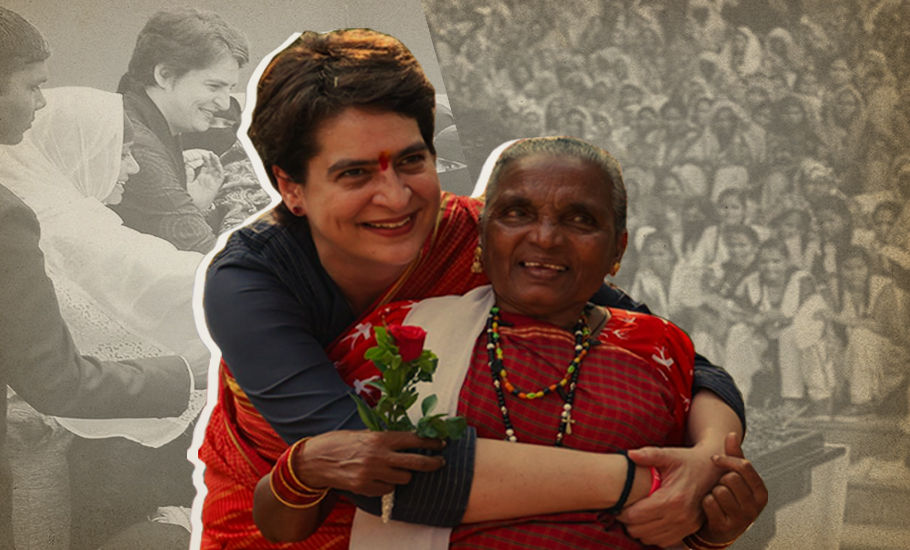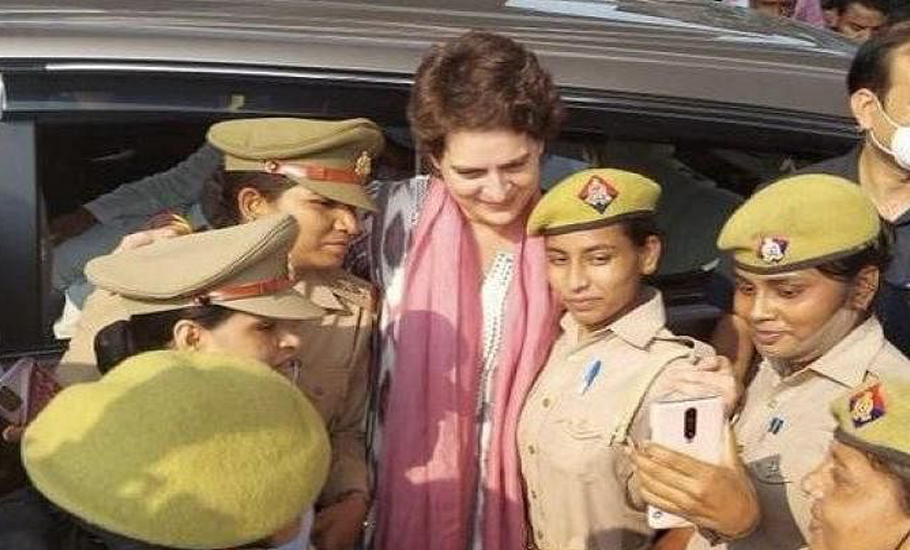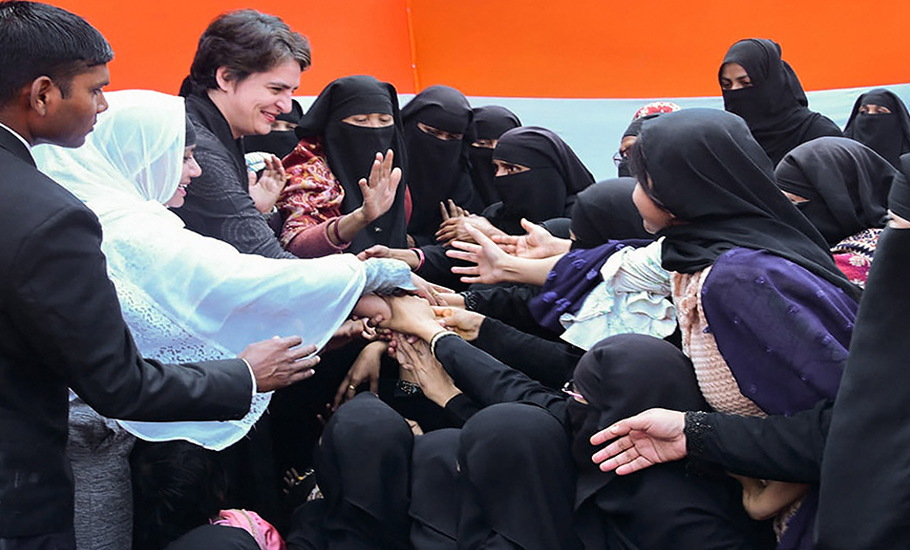
- Home
- News
- Analysis
- States
- Perspective
- Videos
- Education
- Entertainment
- Elections
- World Cup 2023
- Features
- Health
- Business
- Series
- Economy Series
- Earth Day
- Kashmir’s Frozen Turbulence
- India@75
- The legend of Ramjanmabhoomi
- Liberalisation@30
- How to tame a dragon
- Celebrating biodiversity
- Farm Matters
- 50 days of solitude
- Bringing Migrants Home
- Budget 2020
- Jharkhand Votes
- The Federal Investigates
- The Federal Impact
- Vanishing Sand
- Gandhi @ 150
- Andhra Today
- Field report
- Operation Gulmarg
- Pandemic @1 Mn in India
- The Federal Year-End
- The Zero Year
- Premium
- Science
- Brand studio
- Home
- NewsNews
- Analysis
- StatesStates
- PerspectivePerspective
- VideosVideos
- Entertainment
- ElectionsElections
- Sports
- Loading...
Sports - Features
- BusinessBusiness
- Premium
- Loading...
Premium

Congress tries to etch a constituency for Priyanka Gandhi in UP with pink promises

Ghar bhi chalaya hai maine Main desh bhi chala sakti hun Fasal ugayi in haathon ne Sarhad pe bhi lad sakti hun Main ladki hun Lad sakti hun (I have run the house I can run the country My hands have tilled the land I can defend the country’s borders I am a woman I can be a warrior) Based on the Mahishasurmardini ode, this is the campaign pitch with which Congress general secretary...
Ghar bhi chalaya hai maine
Main desh bhi chala sakti hun
Fasal ugayi in haathon ne
Sarhad pe bhi lad sakti hun
Main ladki hun
Lad sakti hun
(I have run the house
I can run the country
My hands have tilled the land
I can defend the country’s borders
I am a woman
I can be a warrior)
Based on the Mahishasurmardini ode, this is the campaign pitch with which Congress general secretary Priyanka Gandhi is attempting to raze to ground Yogi Adityanath’s iron-clad majority of 314 in the 403-member Uttar Pradesh assembly and upset the caste cart of Akhilesh Yadav and Mayawati in early 2022.
'लड़की हूं लड़ सकती हूं' बदलाव की आवाज है, एक नई राजनीति की शुरुआत है।
लड़की हूं लड़ सकती हूं
मैं कुछ भी कर सकती हूं… pic.twitter.com/kdoaDloyrH— Priyanka Gandhi Vadra (@priyankagandhi) December 8, 2021
The Congress released its campaign song on December 8 when it also released its electoral promises packed into a first-of-its-kind pink manifesto. In a state where gruesome incidents of rape are made worse by a government more often than not caught dragging its feet in taking action against perpetrators, the Congress’ women manifesto reads aptly as a resistance song beseeching and invoking action.
The long haul
Without any clearly defined social base, the Congress in UP is only a marginal electoral force. The Congress vote share has failed to reach double digits in the state in recent past. In the 2014 Lok Sabha elections, the party’s vote share was just 7.4 per cent. In the 2017 state polls, the Congress, contesting in alliance with the SP, secured just 6.2 per cent votes. In the 2019 Lok Sabha elections, it won only 6.3 per cent votes.

The Congress knows a miraculous bounce back is not possible. It can at best aim for a gradual revival in the state.
In pitching Priyanka Gandhi as its general in UP’s big electoral battle, the party has taken a risk because a failure could spoil Priyanka’s political resume. The Congress high-command seems to have realised that there is no alternative to leaders leading from the front in rebuilding the party from scratch.
Despite a weak base, Gandhi seems to have succeeded in launching a meaningful and respectably vibrant poll campaign with an innovative focus on the women’s causes by stirring the ultra-conservative land of UP.
Shahira Naim, a prominent journalist based in Lucknow, told The Federal that Priyanka Gandhi’s manifesto is not a transient one-shot election campaign affair. “She has engaged a professional election communication consultancy company which has hired a team of 5-6 very bright and talented women, who are experts in voter data analytics, after a rigorous all-India selection process, and they are doing extensive analysis of the voting preferences of voters in Uttar Pradesh. They are engaged in developing a permanent electoral constituency for Congress and Priyanka and this women’s manifesto is a part of that overall plan,” she says.
Women’s agency in a conservative setting
While gender is an identity much like caste, ethnicity, nativity, nationality and religion, it is not a voting bloc. India has parties formed around all of the above identity markers, except gender. Even today an exclusive women’s political party is inconceivable as women are distributed across all other social categories such as caste, class, ethnicity and so on.
Even though women cannot become an independent political force based on their gender identity, they do have an agency in politics, especially in electoral politics. As they comprise 50 per cent of the electorate, parties of all hues attempt to woo women voters.
In several states, more women than men have been coming out to vote recently. But so far they have at best been offered only some isolated promises. Women, however, are emerging as a politically aware constituency whose votes can often tilt the balance. Their voting choices are increasingly decoupling from the choices made by their spouses.
Similarly, the phenomenon of ‘pati panchayat’—where a woman pradhan’s husband would be the defacto pradhan, actually running the affairs of the panchayat, reducing the elected women to a symbolic figurehead—is also gradually fading and we see a new breed of women who are leaders in their own right.
A Centre for the Study of Developing Societies (CSDS) survey among women voters spread across the country says that all other factors being equal, a sizeable number of women would like to vote for a woman candidate (58 per cent) rather than a male candidate (12 per cent) contesting from the same constituency.
The CSDS survey also suggests that 28 per cent women in urban and rural areas in the country want to enter politics.
Striking a chord
The Congress manifesto, released by Priyanka Gandhi, promises 25 per cent representation for women in the state’s police force apart from promising instant dismissal of police officers who refuse to register rape cases.
The promise finds resonance in a state where pockets like Hathras see Dalit girls get raped in a social milieu where the caste-class nexus teams up with gender to further marginalise women and subject them to sexual assault with impunity.

The manifesto treads beyond just promising security but also resolves to empower women. In a state where only 8.2 per cent women were in the urban labour force and the share was an equally abysmal 9.7 per cent in rural areas in 2017-18, the significance of five employment-related clauses in the manifesto is high.
These promises include 40 per cent reservation for women in all government jobs, tax relief for private businesses ensuring at least 50 per cent of women in their workforce, low-interest soft loans for women-run small businesses, self help group loans at 4 per cent interest and 40 per cent reservation for women in MGNREGA work.
The abysmally low count of women’s participation in the labour force took a big hit due to the pandemic. According to an Azim Premji University survey, only 32 per cent women who were in the labour force in December 2019, remained employed by November 2020. The rest either lost their jobs or quit voluntarily unable to cope with the pandemic stress. Working India was reduced primarily to a masculine India.
According to the All-India Survey of Higher Education (AISHE) report 2019-20, in Uttar Pradesh the gross enrolment ratio at all levels of education is 26.9 per cent. Out of 27.42 lakh women students who had enrolled in undergraduate education only 3.12 lakh (12 per cent) entered into higher education institutes. Against this backdrop, the proposals relating to women’s education in the manifesto sound quite radical.
Free smartphones for girls in Class 12, scooters for girls pursuing undergraduate courses and modern hostels for women in 25 cities among others are promises that, if delivered upon, would go a long way in improving enrolment and even quality of education.
The promise of a free scooty has enthused many college-going girls in the state. “Because of the eve-teasing and sexual harassment girls face while commuting daily most girls are forced to drop out even though their parents can afford the fee,” says Neetu Rawat, a BA student from Khajuri village of Koraon Tehsil.
“If Congress gives scooties, we will definitely vote for the Congress,” she adds.
The manifesto also promises a Rs 10,000 monthly honorarium for Anganwadi workers and ASHAs (Accredited Social Health Activists).
The criticism
From reservation of 40 per cent tickets for women to the umpteen promises made in the manifesto for the upcoming UP polls, the one question that has been incessantly asked is what stops the Congress from delivering on the same in states such as Punjab and Rajasthan where it has its chief ministers.
Unlike Tamil Nadu and Delhi where travel by public transport buses is free for all women, the Congress manifesto extends the free bus travel promise only to women government employees.

While the Rs10 lakh health insurance cover promise for women for treatment of any ailment is quite radical, the offer of pension of Rs 1,000 per month for widows is a paltry sum.
Caution amid hope
Women activists have welcomed the move even though they feel it has come a bit late.
Roop Rekha Verma, social activist and former vice-chancellor of University of Lucknow, says,“Bringing out a women’s manifesto is a welcome move but it has come a bit late. It might not have a major impact on the election results but it has made a beginning in highlighting women’s issues in the political arena. It might take another five years of campaign on this to see fruitful implementation of many of the points in the manifesto.”
Madhu Garg, Uttar Pradesh state secretary of All-India Democratic Women’s Association (AIDWA), the women’s wing of CPI(M), believes while the manifesto has made the right noises, its messaging will take some time to percolate.
“The release of the women’s manifesto is a good development. Priyanka is doing the right thing. It has been highlighted in the media. Political circles are aware of this. But the message has not gone down to the grassroots. Only when the Congress begins the door-to-door campaign, the common women would come to know about this,” Garg says.
Nisha Shrivastav, former professor in the Department of Economics at Allahabad University, believes the Congress manifesto will help change the discourse.
“It is indeed a commendable step, because women’s issues have never taken centre-stage in UP politics. I see there is quite a positive response for the women’s manifesto, from different quarters, especially from young women, and I hope it will change the discourse in the caste-ridden politics of the state,” Shrivastav says.
Padma Singh, leader of Stree Mukti Sangathan, a non-governmental organisation that works for women’s empowerment, says, “Even if some call it populism, this is like a breath of fresh air in a surcharged atmosphere of casteism and communalism. If other parties are forced to emulate this and if 33 per cent women’s reservation bill is also passed, women would be able to dream big.”
Reports indicate that there is already a scramble among women workers of the Congress to get a ticket.
The challenge for the Congress is to ensure that instead of letting the young enthusiasts end up as ‘also-ran candidates’, they should be trained to do ground-level work in cultivating a mass political base and build a formidable election machinery for the Congress in their constituencies.
The manifesto and 161 women candidates of the Congress (40 per cent of 403) can make a beginning in the coming assembly polls.
With the Gandhi siblings infamous as touch-and-go, part-time politicians, it remains to be seen whether Priyanka Gandhi stays in the fight for the long haul and the pink manifesto really serves its role instead of getting reduced to a mere symbolic gesture.

